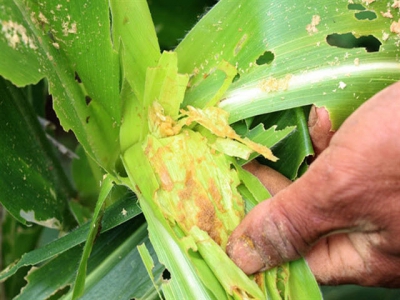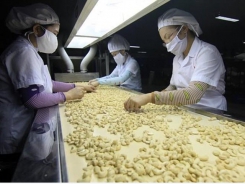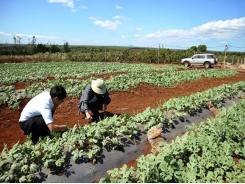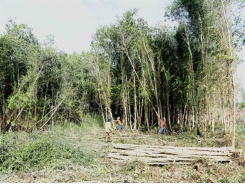Fall armyworm attacks Vietnams agriculture

The fall armyworm has hit Vietnam and caused serious damage to maize crops in recent months, after leading to the loss of billions of dollars in sub-Saharan countries and Asian countries.
Dong Nai Province’s Dinh Quan District reported the first case of fall armyworm in early March on a small maize field of 1.5ha.
Within three weeks, the affected area increased to 276ha, spanning over several other districts of Xuan Loc, Cam My, Trang Bom, Thong Nhat and Tuan Phu.
The insect has also invaded northern and central localities like Nghe An, Thanh Hoa, Phu Tho and Thai Nguyen.
Like an army, each mature worm can eat a corn bud in a few days then keep munching the whole plant. It can pretend to be dead when touched and change body colour based on living environment.
Last week, the Ministry of Agriculture and Rural Development held a meeting with representatives from southern coastal and Central Highlands provinces on fighting the armyworm outbreak.
According to the ministry’s Department of Plant Protection, by mid-July, 15,000ha of 415,000ha of maize nationwide had been affected.
The southern coastal region and Central Highlands have suffered the most severe damage with more than 7,000ha of maize attacked by the pest.
The treatment for fall armyworm is costly and difficult as it requires intensive use of pesticides while the worm’s lifespan is long.
Meanwhile, the corn farming season is different among localities, making it hard to prevent the epidemic from spreading.
Whenever the disease will be controlled is still unknown.
Kpă Thuyen, deputy head of Gia Lai Province People’s Committee, said the provincial agricultural sector was severely impacted by the invasive pest.
“By mid-July, the whole province has had 5,000 ha of the summer – autumn maize crop affected by fall armyworm. The prevention is not effective as people’s understanding about the worm is still limited,” he told Thanh niên (Young people) newspaper.
According to Nguyen Hong Son, director of Viet Nam Academy of Agricultural Sciences, fall armyworm is an alien, invasive species which has just appeared, yet established populations in many regions of the country.
Despite its wide distribution, fall armyworm causes small outbreaks in many different areas.
Deputy minister Le Quoc Doanh noted the invasion of fall armyworm on other plants.
The ministry, therefore, urged for collaboration among local authorities and agencies to guide farmers on pest prevention and to work with international organisations to evaluate treatment solutions and develop pest-resistant plants.
Hoang Trung, head of the Department of Plant Protection, said it sent scientists to Thailand for training on fall armyworm prevention and asked for urgent technical assistance from the UN Food and Agriculture Organisation in Vietnam.
The programme, which will be implemented in two years, focuses on building two breeding centres for parasitic wasps, which are proven to provide up to 70 per cent of control for fall armyworm by leaving their eggs on or inside the pest’s eggs and larvae.
“We are also working with the US Department of Agriculture to ask for assistance in developing biology-based solutions. It is essential to seek for and apply non-chemical, eco-friendly techniques to treat fall armyworm in Vietnam,” he said.
According to the department, there is no specific pesticide for fall armyworm.
Related news
Tools

Phối trộn thức ăn chăn nuôi

Pha dung dịch thủy canh

Định mức cho tôm ăn

Phối trộn phân bón NPK

Xác định tỷ lệ tôm sống

Chuyển đổi đơn vị phân bón

Xác định công suất sục khí

Chuyển đổi đơn vị tôm

Tính diện tích nhà kính

Tính thể tích ao




 Ca Mau adjust list of key local agricultural…
Ca Mau adjust list of key local agricultural…  Cà Mau amends list of key agricultural products
Cà Mau amends list of key agricultural products